How To Choose A Blog Name In 2024 (Beginner’s Guide)

Are you struggling to choose a name for your blog?
We’ve all been there – endlessly listing blog name ideas that aren’t quite what we’re looking for.
Naming a blog is challenging.
To help you choose the perfect blog name, we’ve compiled this two-part guide:
- The first part is a checklist of things to consider and questions to ask yourself. The aim here is to get you thinking about more than just the blog name.
- The second part is a list of tips and tools to help you. We call this the blog naming methods and inspiration section.
This guide will help you no matter which type of blog you want to start. Be it travel, food, lifestyle, finance, health, tech, or something else.
Right, let’s get cracking…
Questions to ask yourself when naming your blog
Here are seven things to consider before naming your blog.
1) What is your blog going to be about?
If you’ve already decided on your niche, then the answer to question one should be straightforward. If you’re still undecided then now is the time to answer the question.
Think about it logically.
If you spend hours choosing a blog name and then decide to blog about something unrelated you’ll have wasted your time. For instance, say you decide on the name ‘Genius Photography’ and then choose the gaming niche.
Of course, if you decide on a non-specific name or use your own name, then you’ll have more room for maneuver.
But, I’d still recommend picking your niche first because it’s a valid exercise.
2) Who is your target audience?
It’s important to consider your target audience when choosing your blog name. Take a look at these two contrasting examples:
Pretty52 has a female target audience:

Pretty52 is the home of women’s entertainment, viral video, celebrity news & showbiz gossip. Discover why our female community loves us so much!
While SPORTBible targets sports fans:

SPORTbible is one of the largest communities for sports fans across the world. With the latest sports news, pictures and videos!
Knowing your target audience will help you choose a suitable name.
3) What is the tone/voice of your blog going to be like?
This question follows on from your target audience. The two examples above – Pretty 52 and SPORTbible – have a young, fresh approach. They’re providing trending news and gossip with pictures and videos.
Contrast SPORTbible with ESPN, and you can see that the latter has a more mature approach to the way its content is written and presented:

Visit ESPN to get up-to-the-minute sports news coverage, scores, highlights and commentary for Football, Cricket, Rugby, F1, Golf, Tennis, NFL, NBA and more.
4) Will you be building your brand around your blog name?
Your blog name can be an excellent way to build and promote your brand, whether you’re selling a product or a service. For example, Pinch of Yum is a food blog with hundreds of simple and tasty recipes. It also provides resources for other food bloggers including photography and monetization tips:
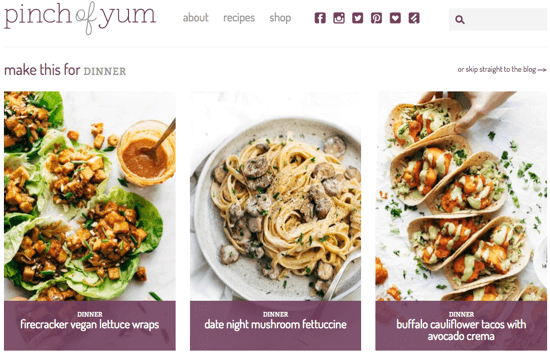
But not all blogs use the name of their company or brand.
LADbible started off where the company name was the same as the blog name. Today it’s the group name of the company with multiple blogs for different niches and audiences; e.g. LADbible, SPORTbible, and Pretty52.
5) Does the blog name read OK when it’s in a domain URL format?
Don’t get caught out on this one. A super blog name can turn into a disaster when you join up separate words and inadvertently create the wrong words.
Here’s a list of unintentional examples, including:

You can see the logo uses two colors to separate the words, but when you look at the domain in plain text, it becomes embarrassing.
Make sure you type your intended blog name into a domain name format and check. It’s also worth getting somebody else to review your idea because it’s easy to become word blind.
Alternatively you can use the Word Safety tool to ensure your blog name won’t cause any future embarrassment.
6) What happens if you change or vary your niche?
We all start a blog with the best of intentions to focus on a niche. But things change. And sometimes you’ll end up switching or varying your original idea.
That’s fine.
But one of the things you’ll need to consider at that point is whether your blog name and brand are right. Are they open-ended enough to allow a shift in direction or do you need to rebrand and start over?
It’s a difficult question to consider because we don’t know what’s going to happen in the future. But if you have any doubts or ideas about possible changes, then you should choose a more open-ended, generic blog name.
However, it’s not the end of the world if you don’t. You can still change. But you might lose momentum in the process.
7) Is it easy to say or spell?
Sometimes a blog name looks great on paper, but when you say it out loud, there’s ambiguity.
This happened to me with my first blog. I thought ‘Byte of Data’ (inspired by Pinch of Yum) was well-suited for a technology blog about cloud storage and backups. That was until I was interviewed by a radio presenter who asked me to confirm the blog name. Then I had to spell it out to listeners to avoid confusion because ‘Byte of Data’ might have been spelled as ‘Bite of Data’.
Photo sharing site ‘Flickr’ also had similar problems because people naturally typed ‘Flicker’. They ended up buying both domains and setting up a permanent redirect, so they didn’t lose business.
Try typing ‘flicker.com’ into the URL bar:
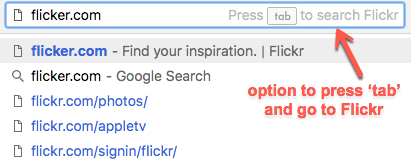
And you’ll get directed to ‘flickr.com’:

Remember: Trying to be clever with words doesn’t always work out best.
Bonus: Want a PDF version of our blog name guide? Click here to get your copy.
How to name your blog: methods and inspiration
It’s time to start naming your blog. Here are ten tools and methods to help you unravel your thoughts.
1) Blog Naming Formulas
Here are two formulas you can try:
a) The ‘Blogging Wizard Magic Blog Name’ Formula
The first formula is the one used by Adam when coming up with blog names:
- blog name = [topic or audience group] + [end goal or transformation]
Here are two examples of blog names created using the formula:
- Digital Velocity = [digital marketers] + [high speed results]
- Startup Bonsai = [small business owners] + [sustainable growth]
- Funnel Overload = [marketing funnels] + [creation and execution]
Note: although the first blog name is quite catchy, and Adam owns the domain, the website isn’t live. But it’s another good example to illustrate how the blog naming formula works.
OK, so here are a couple more examples from the web:
- iPhone Photography School = [iPhone owners] + [lessons on how to take better photos with your iPhone]
- Photography Life = [photographers (all levels)] + [guides on landscape, wildlife, and portrait photography]
Sometimes you can flip the formula around:
- blog name = [end goal or transformation] + [topic or audience group]
- Expert Photography = [become an expert at photography] + [beginner photographers]
Have a go and see what you come up with for your blog name.
b) Create a Portmanteau
A portmanteau is a word that blends the sounds and combines the meanings of two others.
For example:
- ‘podcast’is a combination of the words iPod and broadcast
- ‘brunch’ comes from breakfast and lunch
You can combine two words to create a new word, especially two words that speak about what you’ll help your audience with, or key brand values.
A good example is Primility by Jerod Morris from Copyblogger. It combines ‘Pride’ and ‘Humility’:

- Here’s a long list of portmanteaus for more inspiration.
WordUnscrambler.net has a useful tool for testing these types of words, which leads us to our next section…
2) Blog Name Generators
There are plenty of blog name generators available online. Try these two to get started (they’re great for domain names too):
a) Wordoid
Wordoid is not your typical blog name generator. Worddroid generates made-up words.
They look nice and feel great. They are good for naming things like blogs.
The tool has some input parameters on the left-hand side where you select:
- Language – Select one language to get wordoids constructed according to the rules of that language. Select two or more to blend the tastes of several languages.
- Quality – Defines how wordoids look, sound and feel. The higher it is, the more they resemble the natural words of the selected languages.
- Pattern – Wordoids may begin with, end with or contain a short fragment. Enter something, or leave the field empty to create completely random wordoids.
- Length – Set the maximum length of the wordoids. Short wordoids tend to look better than long ones.
- Domain – Choose whether to show or hide wordoids with both .com and .net domain names unavailable.
Here are some suggestions for ‘high-quality wordoids in English, that contain “camera” and are no more than 10 letters long’:
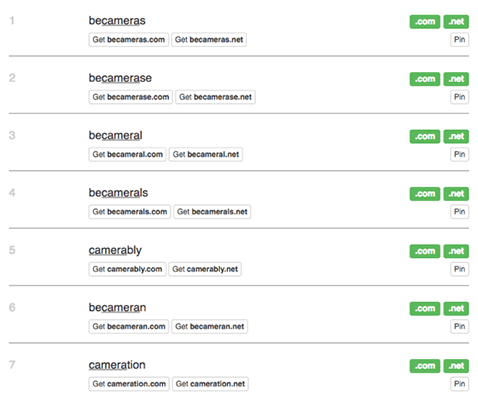
Some are strange, but I could go with cameration. What do you think?
b) Panabee
Panabee is a simple way to search for company names, domain names, and app names:

You enter a couple of words, e.g. ‘camera tricks’, and Panabee generates lots of suggestions derived from phonemes, syllables, abbreviations, suffixes, prefixes, and popular domain trends:
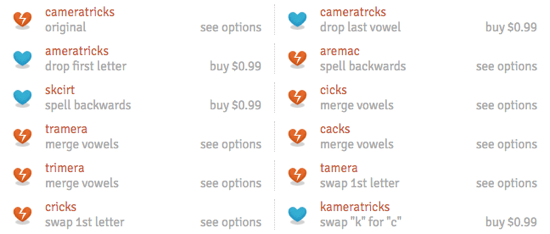
There’s also lists of related terms for each word, plus availability checks on domains, app name, and social media profiles:
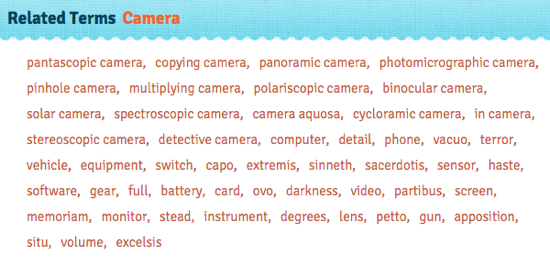
3) Thesaurus
A thesaurus is not a species of dinosaur.
Neither is it a substitute door-stop.
As a writer and blogger, a thesaurus is one of my most-used tools. But it can also be a source of inspiration when you’re trying to come up with your blog name.
Synonyms are those words that have a similar meaning to your keyword. For starters, the word ‘trick’ has many different meanings depending on the context in which it’s used:

If you slide over to the correct tab – ‘expertise, know-how’ – then you get a list of synonyms including method, secret, skill, technique, knack, and swing:
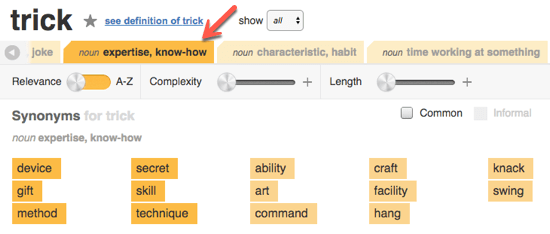
You can also try my favorite vocabulary tool, Word Hippo:

And get similar results including expertise, gift, know-how, method, secret, skill, technique, ability, art, command, craft, facility, hang, knack, and swing:

A thesaurus never lets you down.
4) Alliteration
Alliteration is the repetition of consonants at the beginning of two or more words following each other or at short intervals. Here are some examples:
- Mad Dog Music

- Shooting Star Soccer School

One of the most satisfying things about alliterations is the natural rhythm they bring to your brand name.
You could use your thesaurus again if you need related words rather than your initial words.
5) Abbreviations
An abbreviation can often turn out to be better in the long run than the full-length version of a brand name. Take International Business Machines for example. That’s quite long-winded, and with so many letters there’s a high chance it could get misspelled or mistyped. But IBM is more snappy and memorable.
Three-letter abbreviations seem to do particularly well:
- BMW – Bayerische Motoren Werkein German, or Bavarian Motor Works in English
- RAC – Royal Automobile Club
- PWC – Price Waterhouse Coopers
6) Unrelated words
We’ve looked at related words using a thesaurus to find synonyms. But you can also go in the opposite direction.
Because using unrelated words for your blog name can also prove to be catchy. For example, who would have thought of pairing dogs and music? But that’s what Red Dog Music did:

And then, of course, there’s that famous technology company who use the name of a fruit:
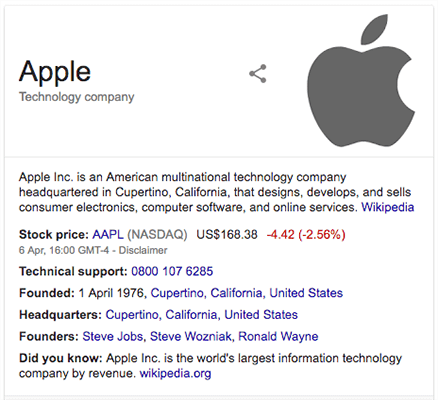
7) Use another language
If you’re struggling to find a unique name in your language, then consider trying a different one. Or combine words from different languages. That’s what I did when I chose Azahar Media.
Azahar is the Spanish word for orange blossom, which I can assure you has nothing to do with my blog. (It’s just an unrelated word that I like):

Media refers to the tools used to store and deliver information or data.
When you combine a foreign name with a familiar name, you can create a unique blog name.
Try using Google Translate to get some inspiration for foreign words, related or unrelated, to your brand.
8) Check your competition
Checking your competitors might not seem like the best idea, but sometimes it can be enough to give you a moment of inspiration. When you see what works for a competitor, you get an idea of what might work for you.
Take a look at some of the popular tech blogs:
- TechCrunch – Startup and technology news
- TechRadar – The source for tech buying advice
- TechVibes – Technology news, innovation, and culture
They all like using the word ‘tech’ plus another distinguishing word. They all cover technology news, but each one has a different slant and emphasis.
9) Pen and paper brainstorm
Sometimes the simplest tools will suffice. There’s nothing wrong with removing any distractions and just writing down what’s in your head. It’s a great way to clear your mind and often you’ll get more inspiration when you see words in front of you, as one idea leads to another.
You can take this one step further and invite friends and family to a brainstorming session. Everyone has a different perspective, and you’re sure to end up with ideas you hadn’t considered.
10) Use your own name
There are pros and cons to using your own name for your blog.
Plenty of bloggers have used their own name. It works well for personal branding services, but on the flip side, it doesn’t work as well if you’re selling a product. Always use the product name in that situation.
Here are a couple of self-named blogs offering services:
- John Espirian uses his second name:

- While Gill Andrews uses her first and second names:

Using your own name also gives you the flexibility to refine or switch niche without having to rebrand.
Ready to start searching domain names? For security purposes, we recommend avoiding registering domains with your web host. Instead, use a separate domain name registrar like Namecheap to check availability & register your domain.
Conclusion
Choosing the ‘right’ blog name depends on your niche, audience, products, and services. Taking time to weigh-up your options now will pay-off over time.
Try a few methods and tools to come up with unique blog name ideas. Play around with words and phrases. And, most importantly, get some feedback before finally deciding on your blog name. If you need more help, check out our domain name ideas article.
Once you’re ready, be sure to check out our guide on how to create a blog.
And, if you’d like to brush up on the basics, check out these articles:
